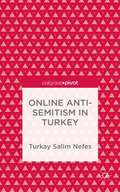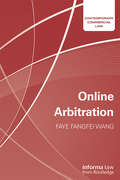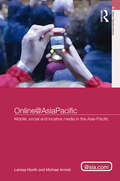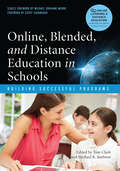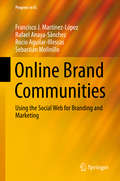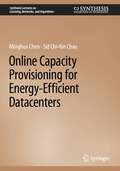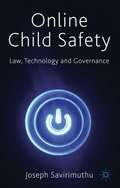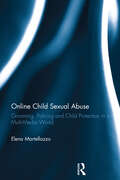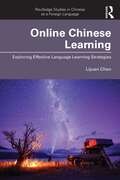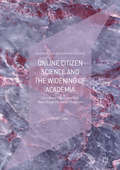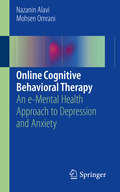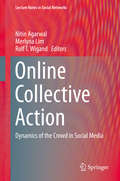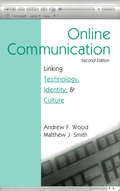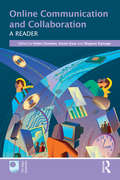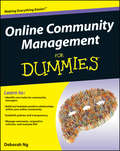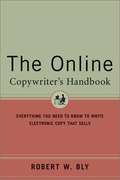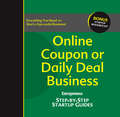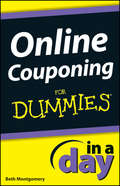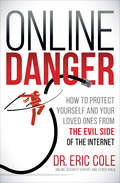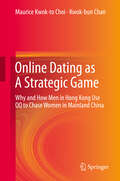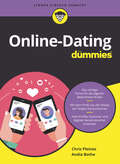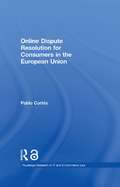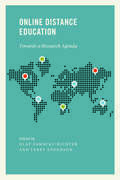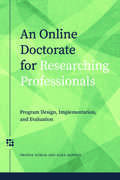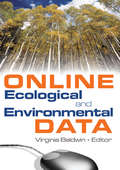- Table View
- List View
Online Anti-Semitism in Turkey (Palgrave Pivot)
by Türkay Salim Nefeshis is the first study that examines online anti-Semitism in Turkey. Nefes surveys important historical events concerning Turkish-Jewry and analyses people's online expressions about Adolf Hitler in the most popular forum website in Turkey,
Online Arbitration (Contemporary Commercial Law)
by Faye Fangfei WangInnovative initiatives for online arbitration are needed to aid in resolving cross-border commercial and consumer disputes in the EU, UK, US and China. This book provides a comparative study of online dispute resolution (ODR) systems and a model of best practices, taking into consideration the features and characteristics of various practical experiences/examples of ODR services and technological development for ODR systems and platforms. The book begins with a theoretical approach, looking into the challenges in the use of online arbitration in commercial transactions and analysing the potential adoption of technology-assisted arbitration (e.g. Basic ODR systems and Intelligent/Advanced ODR systems) in resolving certain types of international commercial and consumer disputes. It then investigates the legal obstacles to adopting ODR by examining the compatibility of technology with current legislation and regulatory development. Finally, it suggests appropriate legal and technological measures to promote the recognition of ODR, in particular online arbitration, for cross-border commercial and consumer disputes. By exploring both the theoretical framework and the practical considerations of online arbitration, this book will be a vital reference for lawyers, policy-makers, government officials, industry professionals and academics who are involved with online arbitration.
Online@AsiaPacific: Mobile, Social and Locative Media in the Asia–Pacific (Asia's Transformations/Asia.com)
by Larissa Hjorth Michael ArnoldMedia across the Asia-Pacific region are at once social, locative and mobile. Social in that these media facilitate public and interpersonal interaction, locative in that this social communication is geographically placed, and mobile in so much as the media is ever-present. The Asia–Pacific region has been pivotal in the production, shaping and consumption of personal new media technologies and through social and mobile media we can see emerging certain types of personal politics that are inflected by the local. The six case studies that inform this book—Seoul, Tokyo, Shanghai, Manila, Singapore and Melbourne—offer a range of economic, socio-cultural, and linguistic differences, enabling the authors to provide new insights into specific issues pertaining to mobile media in each city. These include social, mobile and locative media as a form of crisis management in post 3/11 Tokyo; generational shifts in Shanghai; political discussion and the shifting social fabric in Singapore; and the erosion of public and private, and work and leisure paradigms in Melbourne. Through its striking case studies, this book sheds new light on how the region and its contested and multiple identities are evolving, and concludes by revealing the impact of mobile media on how place is shaped, as well as shaping, practices of mobility, intimacy and a sense of belonging. Employing comprehensive, cross-disciplinary frameworks from theoretical approaches such as media sociology, ethnography, cultural studies and media and communication studies, Online@AsiaPacific will be of huge interest to students and scholars of Asian culture and society, cybercultures, new media studies, communication studies and internet studies.
Online, Blended, and Distance Education in Schools: Building Successful Programs (Higher Education Ser.)
by Michael Grahame Moore Cathy Cavanaugh Tom Clark Michael K. BarbourCo-Published with the Microsoft Corporation Online, Blended and Distance Education in Schools provides students enrolled in Education Technology, Educational Administration and related Masters and PhD programs with expert opinions and insights on the practice and policy in K-12 online, blended and distance education, online and blended programs, including curriculum, instruction, technology and management aspects. It describes the status and trends of the field, provides illustrative program examples, explores the issues and challenges that programs face and highlights ongoing research in key areas related to program effectiveness. Topics discussed:* The current status of K-12 online, distance and blended learning in the U.S.* Policy, funding, and management issues in relation to program implementation* Research on effective programs within governmental jurisdiction and various program types* Global case studies that represent the variety of ways programs are being successfully implemented * A synthesis of key findings and lessons learned, and local and global visions for the future of K-12 distance and online learningThis text is highly appropriate for students enrolled in Educational Technology, Educational Administration and related Masters and PhD programs. An online companion resource provides pedagogical features that enhance text use in a classroom setting.
Online Brand Communities
by Sebastián Molinillo Rocio Aguilar-Illescas Rafael Anaya-Sánchez Francisco J. Martínez-LópezThis book presents and analyzes the concept of online brand communities, an emerging and exciting topic in marketing and eCommerce. First, it lays out the foundations like the evolution of the Web and the so-called Social Web, its utility for users and businesses, and the evolution of the marketing mind-set to adapt the Social Web. On this basis, the book then presents a detailed analysis of online brand communities, examining the concept of virtual community with a specific focus on virtual brand communities. In this context the book also explores recent trends related to branding and brand management. Next, it proposes a classification system for online brand communities, taking into account questions like the motivating factors for consumers to join, participate and stay in a community. The process of value creation in communities is examined from both business and consumer perspectives. The book draws to a close with a brief presentation of the process broadly accepted for the successful development of online brand communities.
Online Capacity Provisioning for Energy-Efficient Datacenters (Synthesis Lectures on Learning, Networks, and Algorithms)
by Minghua Chen Sid Chi-Kin ChauThis book addresses the urgent issue of massive and inefficient energy consumption by data centers, which have become the largest co-located computing systems in the world and process trillions of megabytes of data every second. Dynamic provisioning algorithms have the potential to be the most viable and convenient of approaches to reducing data center energy consumption by turning off unnecessary servers, but they incur additional costs from being unable to properly predict future workload demands that have only recently been mitigated by advances in machine-learned predictions.This book explores whether it is possible to design effective online dynamic provisioning algorithms that require zero future workload information while still achieving close-to-optimal performance. It also examines whether characterizing the benefits of utilizing the future workload information can then improve the design of online algorithms with predictions in dynamic provisioning. The book specifically develops online dynamic provisioning algorithms with and without the available future workload information. Readers will discover the elegant structure of the online dynamic provisioning problem in a way that reveals the optimal solution through divide-and-conquer tactics. The book teaches readers to exploit this insight by showing the design of two online competitive algorithms with competitive ratios characterized by the normalized size of a look-ahead window in which exact workload prediction is available.
Online Child Safety
by Joseph SavirimuthuThis work explores the growing convergence between youth culture and digital communication technologies and the corresponding challenges posed to policymakers, examining the current governance debate on online child safety.
Online Child Sexual Abuse: Grooming, Policing and Child Protection in a Multi-Media World
by Elena MartellozzoOnline Child Sexual Abuse: Grooming, Policing and Child Protection in a Multi-Media World addresses the complex, multi-faceted and, at times, counter-intuitive relationships between online grooming behaviours, risk assessment, police practices, and the actual danger of subsequent abuse in the physical world. Online child sexual abuse has become a high profile and important issue in public life. When children are victims, there is clearly intense public and political interest and concern. Sex offenders are society’s most reviled deviants and the object of seemingly undifferentiated public fear and loathing. This may be evidenced in ongoing efforts to advance legislation, develop police tactics and to educate children and their carers to engage with multi-media and the internet safely. Understanding how sex offenders use the internet and how the police and the government are responding to their behaviour is central to the development of preventative measures. Based on extensive ethnographic research conducted with the police and a specialist paedophile unit, here Elena Marellozzo presents an informed analysis of online child sexual abuse: of the patterns and characteristics of online grooming, and of the challenges and techniques that characterize its policing. Connecting theory, research and practice in the field of policing, social policy, victimology and criminology, this book adds significantly to our understanding and knowledge of the problem of online child sexual abuse, the way in which victims are targeted and how this phenomenon is, and might be, policed.
Online Chinese Learning: Exploring Effective Language Learning Strategies (Routledge Studies in Chinese as a Foreign Language)
by Lijuan ChenOnline Chinese Learning aims to investigate the types of language learning strategies (LLSs) that online Chinese learners use across asynchronous and synchronous learning environments in different learning contexts.This book examines how the use of language learning strategies by online Chinese learners is influenced by the interactants; the characteristics of the specific learning context; and selected individual learner characteristics. This book will provide: (1) new and detailed information about students’ LLS use in online Chinese learning; (2) insights into how individual students adopt LLSs and technological tools to solve learning problems in various learning contexts; (3) an exploration of factors influencing LLS use; and (4) recommendations regarding LLS adoption, use, and training.This book will be a valuable resource for university instructors in languages, language teaching methods, and second language acquisition, as well as researchers in languages, linguistics, and language learning and teaching.
Online Citizen Science and the Widening of Academia: Distributed Engagement With Research And Knowledge Production (Palgrave Studies In Alternative Education Ser.)
by Vickie CurtisThis book examines the increasing popularity of online citizen science projects arising from developments in ICT and rapid improvements in data storage and generation. As these new technologies allow for much higher levels of participation, collaboration and interaction, the author explores what online citizen science projects reveal about the ‘democratisation’ of science and distributed engagement with authentic research. Analysing the wider appeal of these projects as well as their potential for informal science learning and creating communities of practice, this book asks whether ‘citizen’ and ‘researcher’ will ever be on equal footing. Drawn from years of mixed-methods research, this volume sheds light on this under-researched subject area despite its recent growth and enormous potential. It is sure to be of interest to students and scholars of democratised knowledge, citizen science and online learning, as well as those already involved in citizen science.
Online Cognitive Behavioral Therapy: An E-mental Health Approach to Depression and Anxiety
by Nazanin Alavi Mohsen OmraniThis book aims to provide the clinicians with details of online cognitive behavioral therapy (CBT) to facilitate care delivery for patients struggle with depression and anxiety. Chapters cover some of the most fundamental concepts for successful treatment, including experiments, action plans evidence, and the guidelines for managing, thoughts, feelings, and other key concerns. Designed to be a reader-friendly guide, each chapter opens with a summary of the content and a recap of concepts covered in previous sections, making this highly functional for individual chapter or whole book use. Each chapter also includes recommended tables and chart to facilitate the documentation of each recommended session, making this highly practical resource a vital tool for those who treat patients suffering from these particular mental health concerns.
Online Collective Action
by Nitin Agarwal Merlyna Lim Rolf T. WigandThis work addresses the gap in the current collective action literature exposed by the new Information and Communication Technologies (ICTs) landscape by bringing together qualitative and quantitative studies from computational and social sciences. The book offers a rigorous and systematic investigation of both methodological and theoretical underpinnings and, thus, collectively promotes a symbiotic and synergistic advancement of the multiple interconnected disciplines in studying online collective actions. More specifically, the book is intended to illuminate several fundamental and powerful yet theoretically undeveloped and largely unexplored aspects of collective action in the participatory media (e. g. , social media). Through in-depth exploration of relevant concepts, theories, methodologies, applications, and case studies, the reader will gain an advanced understanding of collective action with the advent of the new generation of ICTs enabled by social media and the Internet. The developed theories will be valuable and comprehensive references for those interested in examining the role of ICTs not only in collective action but also in decision and policy making, understanding the dynamics of interaction, collaboration, cooperation, communication, as well as information flow and propagation, and social network research for years to come. Further, the book also serves as an extensive repository of data sets and tools that can be used by researchers leading to a deeper and more fundamental understanding of the dynamics of the crowd in online collective actions.
Online Communication: Linking Technology, Identity, & Culture (Routledge Communication Series)
by Andrew F. Wood Matthew J. SmithOnline Communication provides an introduction to both the technologies of the Internet Age and their social implications. This innovative and timely textbook brings together current work in communication, political science, philosophy, popular culture, history, economics, and the humanities to present an examination of the theoretical and critical issues in the study of computer-mediated communication. Continuing the model of the best-selling first edition, authors Andrew F. Wood and Matthew J. Smith introduce computer-mediated communication (CMC) as a subject of academic research as well as a lens through which to examine contemporary trends in society. This second edition of Online Communication covers online identity, mediated relationships, virtual communities, electronic commerce, the digital divide, spaces of resistance, and other topics related to CMC. The text also examines how the Internet has affected contemporary culture and presents the critiques being made to those changes. Special features of the text include:*Hyperlinks--presenting greater detail on topics from the chapter*Ethical Ethical Inquiry--posing questions on the nature of human communication and conduct online*Online Communication and the Law--examining the legal ramifications of CMC issues Advanced undergraduates, graduate students, and researchers interested in the field of computer-mediated communication, as well as those studying issues of technology and culture, will find Online Communication to be an insightful resource for studying the role of technology and mediated communication in today's society.
Online Communication and Collaboration: A Reader
by Helen Donelan Karen Kear Magnus RamageCommunication and collaboration via the Internet has risen to great prominence in recent years, especially with the rise of social networking, Web 2.0 and virtual worlds. Many interesting and worthwhile studies have been conducted on the technology involved and the way it is used and shaped by its user communities. From some of the more popular coverage of these interactions, it might be thought that these are new phenomena. However, they draw on a rich heritage of technologies and interactions. Online communication and collaboration presents a very timely set of articles that cover a range of different perspectives upon these themes, both classic and contemporary. It is unusually broad in the range of technologies it considers - many books on these topics cover only a few forms of collaboration technology - and in considering well-established technologies as well as recent ones. It blends academic and popular articles to combine scholarly rigour with readability. The book is divided into eight sections, covering the foundations of online communication and collaboration, together with current collaboration technologies such as wikis, instant messaging, virtual worlds and social network sites. These modern communication tools are considered in terms of their interactions but also looking back at lessons to be learnt from their technological 'ancestors'. The book also contains an extended case study of online collaboration, taking open-source software as its example. Online communication and collaboration will be of relevance in a wide range of higher education courses in fields related to soft computing, information systems, cultural and media studies, and communications theory.
Online Community Management For Dummies
by Deborah NgLearn to manage, grow, and communicate with your online community Online community management is a growing profession and companies are investing in online communities in order to gain consumer insights into products and to test new products. An effective and dedicated community manager is essential to engage and manage a successful online consumer community. This straightforward-but-fun guide shows you how to effectively manage, grow, and communicate with your online community. Clear coverage shares tips for dealing with customers and fans through Twitter, Facebook, forums, and blogs. A practical approach shows you how to ensure that visitors to your site are satisfied, kept happy, and return. You'll explore the various types of online communities and benefit from learning an assortment of tips and tools that will help you stand out above the competition, attract more visitors and gain the attention of potential advertisers and investors. Aims at providing community managers the information they need to get a handle on their online communities and make them successful Addresses the role of the community manager, the core community management tasks, and how to create an online community Highlights ways to build relationships within your community, evaluate return on investment, and handle and respond to criticism Offers advice for establishing policies and transparency and encouraging community interaction Online Community Management For Dummies is the ideal introductory guide for making sure that visitors to your site have a good experience and return for more.
The Online Copywriter's Handbook
by Robert W. BlyEverything You Need to Know to Write Electronic Copy That Sells.
Online Coupon or Daily Deal Business
by Rich Mintzer Entrepreneur MagazineUnlike old-school "design your own coupon book" titles, this book moves straight into computer technology and proceeds to the latest trend in couponing... apps, which provide deals to mobile users wherever they may be. Of particular interest are the sections describing how to make a splash in the highly lucrative, but also competitive daily deal segment of the market, where Groupon and LivingSocial reign supreme. Included within, readers will how to: Build an online network of followers which can translate into customers Attract merchants Join affiliate coupon or daily deal programs Find your niche market Create an aggregator site, in which you present the best of the best from daily deal or coupon websites. Market your coupon or daily deal site through the social mediaOf particular interest is a chapter devoted to working closely with your merchants to provide coaching and guidance on how the daily deal industry works from their perspective. Many daily deal businesses do not work to enhance the experience for their merchants. Readers, however, can learn how to do so. Experts in the industry are also included such as Marc Horne, co-creator of Daily Deal Builder, who discusses what it takes to build a daily deal site, David Teichner, CEO of Yowza!! who brought deal apps to iPhones and several business owners who have tried their luck at running daily deal. They discuss what they have learned from the process.Currently there are few, if any, other books on how to start a daily deal business and the coupon books focus on how to use coupons and even on extreme couponing, but not on running an online coupon business. This is a unique title which provides those who enjoy offering deals and discounts to get started in an industry that is still growing.All Entrepreneur Step-By-Step Startup Guides Include: Essential industry-specific startup steps with worksheets, calculators, checklists and more Bestselling title,Start Your Own Business by Entrepreneur Media Inc., a guide to starting any business and surviving the first three years Downloadable, customizable business letters, sales letters, and other sample documents Entrepreneur's Small Business Legal Toolkit
Online Couponing In a Day For Dummies
by Beth MontgomeryCoupon online like a pro and save big money with this 100-page e-bookOn a budget and need help figuring out how to coupon online? This concise e-book will show you where to go online to find the best store and manufacturer coupons, how to combine them for the best deals, and how to stay organized. Get this bargain priced e-book with "beyond the book" extras including a video demonstration, checklist, and more.Contains 100 pages of couponing tips, techniques, and ideas for saving moneyIncludes extras online, including a video, checklists, and moreShows how to find, use, and combine money-saving coupons, and keep them organized Tired of sifting through hundreds of blogs looking for coupons? Here?s an online couponing guide you can trust: Online Couponing In A Day for Dummies.
Online Danger: How to Protect Yourself and Your Loved Ones from the Evil Side of the Internet
by Eric ColeCyberspace is an informative, fun, and educational place for the entire family, but danger lurks everywhere you turn online. From phishing to cyber bullying to identity theft, there are a myriad of ways that you and your loved ones could be harmed online, often with irreparable damage. Fortunately, there are precautions that everyone can take to protect themselves, their families, and their businesses that dont require advanced (or even any) technical knowledge. In this book, cyber security expert, Dr. Eric Cole, provides a laymans look at how to protect yourself online.Dr. Cole makes the case that everyone is a potential target, not just the rich and famous. And we all have the ability to make it more difficult for cyber criminals to make us their next victim. He explains in plain language how to make your computer safer, protect your email, and guard your online accounts.Online Danger: How to Protect Yourself and Your Loved Ones from the Evil Side of the Internet applies to organizations as well as individuals, and across professions. Doctors, lawyers, and teachers anyone responsible for safeguarding a clients or students data will learn something they can use right away.Whether youre a parent wanting to know how to keep your children safe as they use the Internet, or a senior citizen who doesnt want to fall prey to an online scammer, or a daily technology user who wants to learn more about how to protect themselves in cyberspace, this book is for you.
Online Dating as A Strategic Game
by Maurice Kwok-to Choi Kwok-Bun ChanBased on a study using online ethnography as the major research method, this book explains why and how men in Hong Kong use QQ--an online instant messenger--to "chase" women in mainland China, especially in the neighboring city of Shenzhen. Chasing women through QQ is a reciprocal exchange process during which the resources to be exchanged in the interaction are not negotiated. Rather, the men provide resources to the women, hoping for rewards in return that are not guaranteed. This characteristic of the exchange makes men who chase women through QQ very strategic in their action. They try to maximize the rewards and minimize the costs by adopting myriad strategies, such as constructing an attractive online identity by strategic self-presentation. The role of emotions in the exchange process is also examined. Men learn the emotional norms through the online forum, but sometimes it is difficult for them to control their emotions; some men fall in love when they are not supposed to. As it happens, they have failed to calculate the costs and rewards rationally in that they may provide too many resources to the women without getting enough rewards in return. This book provides original insights into the thought processes, motivations, desires, anxieties and risks of Hong Kong men seeking short-term sexual relations with women on the mainland. These insights are highly relevant to our understanding of the quickly evolving use of social media, a phenomenon of worldwide importance and deep implications.
Online-Dating für Dummies (Für Dummies)
by Chris Pleines Andia BotheOnline-Dating boomt. Die wenigsten Singles lernen sich heutzutage noch in einer Bar kennen. Allein in Deutschland sind jeden Monat weit über 12 Millionen Singles online auf Partnersuche. Wo und wie findet man da aber, was man wirklich sucht? Und wie sticht man aus der Masse der Singles hervor? Wo finde ich den richtigen Partner für mein Alter, meinen Typ und meine Interessen und Absichten - ob langfristige Beziehung, Flirt oder doch nur Sex? Und wie kann ich sicher daten? Die beiden Dating-Experten Chris Pleines und Andia Bothe führen Sie umfassend durch die digitale Dating-Welt von heute (und morgen).
Online Dispute Resolution for Consumers in the European Union (Routledge Research in Information Technology and E-Commerce Law)
by Pablo CortésA PDF version of this book is available for free in open access via www.tandfebooks.com as well as the OAPEN Library platform, www.oapen.org. It has been made available under a Creative Commons Attribution-Non Commercial-No Derivatives 3.0 license and is part of the OAPEN-UK research project. E-commerce offers immense challenges to traditional dispute resolution methods, as it entails parties often located in different parts of the world making contracts with each other at the click of a mouse. The use of traditional litigation for disputes arising in this forum is often inconvenient, impractical, time-consuming and expensive due to the low value of the transactions and the physical distance between the parties. Thus modern legal systems face a crucial choice: either to adopt traditional dispute resolution methods that have served the legal systems well for hundreds of years or to find new methods which are better suited to a world not anchored in territorial borders. Online Dispute Resolution (ODR), originally an off-shoot of Alternative Dispute Resolution (ADR), takes advantage of the speed and convenience of the Internet, becoming the best, and often the only option for enhancing consumer redress and strengthening their trust in e-commerce. This book provides an in-depth account of the potential of ODR for European consumers, offering a comprehensive and up to date analysis of the development of ODR. It considers the current expansion of ODR and evaluates the challenges posed in its growth. The book proposes the creation of legal standards to close the gap between the potential of ODR services and their actual use, arguing that ODR, if it is to realise its full potential in the resolution of e-commerce disputes and in the enforcement of consumer rights, must be grounded firmly on a European regulatory model.
Online Distance Education: Towards a Research Agenda
by Olaf Zawacki-Richter Terry AndersonOnline Distance Education: Towards a Research Agenda provides a systematic overview of the major issues, trends, and areas of priority in online distance education research. In each chapter an international expert or team of experts provides an overview of one relevant issue in online distance education, discussing theoretical insights that guide the research, summarizing major research on the topic, posing questions and directions for future research, and discussing the implications for distance education practice as a whole. Intended as a primary reference and guide for distance educators, researchers, and policymakers, Online Distance Education takes care to address aspects of distance education practice that until now have often been marginalized, including issues of cost and economics, social justice implications, cultural impacts, faculty professional development, and the management and growth of learner communities. At once soundly empirical and thoughtfully reflective, yet also forward-looking and open to new approaches to online and distance teaching, this text is a solid resource for researchers in a rapidly expanding discipline.
An Online Doctorate for Researching Professionals: Program Design, Implementation, and Evaluation (Issues in Distance Education)
by Swapna Kumar Kara DawsonThe interest in and demand for online terminal degress across disciplines by professionals wishing to conduct research and fulfill doctoral degree requirements at a distance is only increasing. But what these programs look like, how they are implemented, and how they might be evaluated are the questions that challenge administrators and pedagogues alike. This book presents a model for a doctoral program that bridges theory, research, and practice and is offered completely or largely online. In their described program model, Kumar and Dawson enable researching professionals to build an online communtiy of inquiry, engage in critical discourse within and across disciplines, learn from and with experts and peers, and generate new knowledge. Their program design is grounded in the theoretical and research foundations of online, adult, and doctoral education, curriculum design and community-building, implementation and evaluation. The authors, who draw on their experience of implementing a similar program at the University of Florida, not only share data collected from students and faculty members but also reflect on lessons learned working on the program in diverse educational contexts. An important guide for program leaders who wish to develop and sustain an online professional doctorate, An Online Doctorate for Researching Professionals will also be a valuable resource for higher education professionals seeking to include e-learning components in existing on-campus doctoral programs.
Online Ecological and Environmental Data
by Virginia Ann BaldwinDiscover important Internet resources for research data made public individually and collectively by researchers from a variety of entities in the fields of environmental studies and ecology Online Ecological and Environmental Data explores innovative projects from a diverse array of institutions that have made environmental and ecological research information freely available online. You will find a wealth of Web site listings with URLs and complete descriptions, data field descriptions, controlled vocabulary examples, and Web screen shots that demonstrate how to use a specific site. The book will help you locate the data, procedures, instruments, notes, and other descriptive information that scientists and engineers need for replicating and building on the research of others. With Online Ecological and Environmental Data, you'll gain a better understanding of: * the cooperative design, development, and management of interdisciplinary data * cataloging multidisciplinary environmental data * data networking * new developments in information science and technology * extracting and compiling data * the convergence and dissemination of information via the Internet This unique resource explores the potential of distributing actual research data on the Web. The information you'll find in this book will enable science and technology librarians to provide effective access to library patrons. Online Ecological and Environmental Data will give librarians and other information specialists-as well as faculty and students in library sciences and technology-cutting-edge knowledge to meet the global data and information needs of the scientific community. The projects described in this book can serve as models for other disciplines, especially for the various aspects of handling data made available online, and for making this data more available and usable on the Internet for researchers and students.
